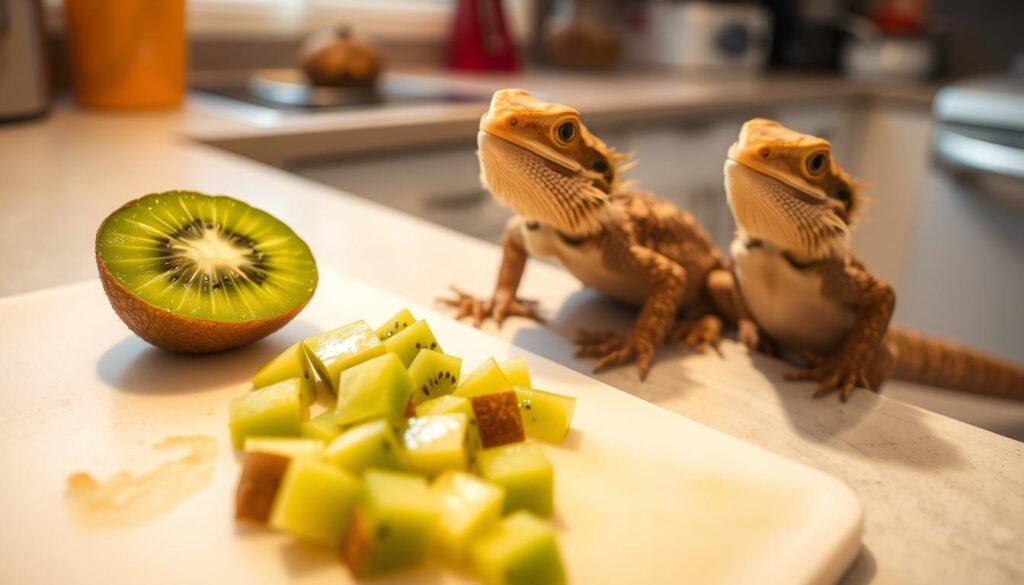A single kiwi has only 42 calories and 2 grams of sugar. It seems like a great low-calorie treat for bearded dragons. But, these pets face special dietary challenges, like the risk of oxalates in foods like kiwi. Oxalates can block calcium absorption.
Kiwi does offer vitamins and protein. But, its effect on calcium metabolism is something to think about. Bearded dragons are at risk for metabolic bone disease. So, can they eat kiwi safely? The answer depends on balancing its good points with careful feeding rules.
Bearded dragons love sweet flavors, but they need a diet that’s 50% plant-based and 50% insects. Fruits like kiwi should only make up 10-20% of their plant food. Owners need to consider kiwi’s 8 grams of protein and its oxalic acid content.
This could affect calcium uptake, which is key for bone health. This article looks at how kiwi fits into their complex nutritional needs. It covers calcium-to-phosphorus ratios and portion control.
Understanding Bearded Dragon Dietary Needs
Bearded dragons need a diet that matches their wild habits and age. In the wild, they eat insects, greens, and sometimes fruits. Keeping them healthy in captivity means copying these eating habits.
Natural Diet of Bearded Dragons in the Wild
In Australia’s dry lands, bearded dragons look for crickets, beetles, and plants. Young ones eat insects every day. As they grow, they start to eat more plants, about 80% of their diet. They also get fruits seasonally, which keeps their sugar intake low.
Importance of Balanced Nutrition for Captive Dragons
For dragons in captivity, a balanced diet is key. It should include:
- Adults: 20% protein (insects) + 80% greens
- Juveniles: 80% protein + 20% plants
They need insects like dubia roaches and superworms for calcium. Too much protein can make adults fat. Not enough calcium can cause bone problems.
The Role of Fruits in a Bearded Dragon’s Diet
| Food Category | Recommended Frequency |
|---|---|
| Leafy greens (kale, collards) | Every day |
| Vegetables (squash, carrots) | 3-4x/week |
| Fruits | Once or twice monthly |
Fruits like kiwi should be given only as treats. They are too sweet and can harm their teeth and make them fat. Safe fruits like berries and melon can be given in small amounts, about 1-2 tsp, once a week.
Good nutrition is key to a long life for bearded dragons. They can live up to 10-12 years with the right care. Regular vet visits and a clean home are important. Adding fruits like kiwi in small amounts is okay.
Can Bearded Dragons Eat Kiwi?
Bearded dragons can have kiwi as an occasional treat. Kiwi adds vitamins and hydration but should be given in small amounts. Their main diet should include leafy greens and protein, with kiwi as a rare treat.

Kiwi has 35 mg of calcium and 34 mg of phosphorus per 100g. This is a 1:1 ratio, which is not enough for young dragons. Young dragons need a 2:1 calcium-to-phosphorus ratio for their bones to grow.
Adult dragons can handle kiwi better but they also need a 1.5:1 ratio. If the ratio is not balanced, it can weaken their bones over time.
| Nutrient | Kiwi (per 100g) | Dragon Dietary Needs |
|---|---|---|
| Calcium | 35 mg | Adults: 1.5-2:1 Ca:P ratio |
| Phosphorus | 34 mg | Juveniles: 2:1 Ca:P ratio |
| Sugar | 9.5g | Limit to 5% of total diet |
| Oxalalates | 29 mg | Risk of long-term kidney stress |
Feeding guidelines suggest kiwi as a monthly treat. Here’s why:
- Adults: 1-2 small slices once monthly
- Never feed to juveniles under 1 year
- Pair with calcium-rich greens to balance ratios
Kiwi boosts immunity with vitamin C but its oxalates block calcium absorption. Always wash it well and remove seeds before giving it to your dragon. Too much kiwi can be harmful because of its limited nutritional value.
Nutritional Composition of Kiwi
Kiwi’s nutritional makeup is special for bearded dragons. Fruits like kiwi are treats, but they can add to a balanced diet. They are rich in vitamin C, vitamin K, potassium, and folate. These nutrients help with immune function and bone health.
But, kiwi’s calcium-to-phosphorus ratio is not perfect for reptiles. They need a 2:1 ratio, but kiwi has a 1:1 ratio.
- Vitamin C: Boosts immunity and aids iron absorption.
- Vitamin K: Supports blood clotting and bone metabolism.
- Potassium: Regulates fluid balance and nerve function.
- Calcium: 35 mg per 100g supports bone health, but paired with phosphorus limits absorption.
Sugar Content in Kiwi Fruit:
Kiwi has 14g of carbohydrates per 100g, with 2g natural sugar per fruit. It’s less sweet than other fruits. But, too much sugar can lead to obesity or upset stomach.

Water Content and Hydration Benefits:
Kiwi is 83.9% water, making it great for hydration. It’s perfect for keeping dragons hydrated, helping their kidneys and skin.
When thinking about the health benefits of kiwi for beardies, remember to use it sparingly. Mix its hydration benefits with a diet rich in leafy greens and protein from insects. Stick to the 10-20% fruit/vegetable rule. Always balance kiwi’s nutrients with their dietary needs to avoid mineral imbalances.
Potential Health Benefits of Kiwi for Bearded Dragons
Kiwi can be good for bearded dragons if given right. It has vitamins C and E, which help fight off sickness and damage. It also has calcium and phosphorus in the right ratio, which is good for their bones.
Kiwi also has fiber, which helps with digestion and prevents constipation. It has less fat and protein than many treats. Vitamins C and potassium help with immunity and heart health. Plus, it has few calories, which is great for keeping weight in check.
- Vitamins C and E reduce oxidative stress and enhance immunity.
- Calcium-phosphorus balance supports bone health when supplemented properly.
- Fiber content aids in regular bowel movements and gut health.
- Low sodium helps manage electrolyte balance in their systems.
Kiwi can be a good treat for bearded dragons if given in small amounts. It fills in the gaps of their usual diet of insects and greens. But, it should not replace their main foods like collard greens. Make sure to remove the skin because it’s hard to digest. Giving kiwi once a month is a good way to give them its benefits without too much sugar or oxalates.
Can Bearded Dragons Eat Asparagus Raw?
Risks and Concerns When Feeding Kiwi to Bearded Dragons
Feeding kiwi to pet dragons needs careful thought. Kiwi has vitamins, but it also has downsides. We must ensure it’s safe for them to eat.

Oxalates in Kiwi and Their Impact
Kiwi has oxalates, which can block calcium absorption. This can weaken bones or cause kidney stones. A single kiwi has up to 29mg of oxalates, affecting calcium-phosphorus balance.
- Oxalates tie up calcium, increasing metabolic bone disease risk
- Long-term feeding may impair growth and skeletal strength
- Overconsumption links to kidney stone formation
Acidic Nature of Kiwi and Digestive Concerns
Kiwi is very acidic, with a pH of 3.1-3.96. Eating too much can cause diarrhea, dehydration, or tiredness. Young dragons are more at risk because their digestive systems are not fully developed.
Sugar Content Considerations
Kiwi has natural sugars (8.99g per fruit). Eating too much can lead to obesity and diabetes. Here’s how kiwi compares to other fruits:
| Fruit Type | Calcium:Phosphorus Ratio | Total Sugars (g) | Risk Notes |
|---|---|---|---|
| Green kiwi | 1:1 | 8.99 | Imbalanced mineral ratio |
| Red globe grapes | 0.5:1 | 16.3 | Higher sugar but better C:P |
| Papaya | 2:1 | 14.3 | Calcium-rich but high sugar |
Experts say to only give kiwi once a month. Always add calcium-rich greens to balance out phosphorus. Watch for signs like loss of appetite or loose stools after eating. More than half of owners don’t give enough greens, as found by Barboza et al (2022). This shows the importance of moderation.
How to Properly Prepare Kiwi for Your Bearded Dragon
When feeding kiwi to pet dragons, it’s important to prepare it right. Start by picking a ripe kiwi. Avoid overripe or unripe ones as they can upset your dragon’s stomach. Make sure to wash the fruit well to get rid of any pesticides.
Choosing organic kiwi is best to avoid chemicals. This keeps your pet healthy and happy.

Washing and Cleaning Procedures
Rinse the kiwi for 30 seconds, gently scrubbing the skin. Then, dry it with a clean cloth. Don’t feed your dragon any kiwi that’s bruised or looks off. This helps avoid bacterial problems.
Cutting and Serving Suggestions
- Cut the kiwi lengthwise and scoop out the flesh with a spoon.
- Throw away the tough, fibrous peel. Dragons can’t digest it.
- Cube the flesh into ¼-inch pieces for adults. For younger dragons, make them smaller.
- Keep the seeds in. They’re safe and add texture.
- Mix the kiwi with greens like collard greens. This balances out the nutrients.
Portion Size Recommendations
Adult dragons can have 1-2 tablespoons of kiwi at a time. That’s about 1/8 to 1/4 of a medium fruit. Younger dragons should get half that amount.
Don’t let kiwi make up more than 5% of their diet. Add a calcium supplement 15 minutes before feeding. This helps counteract the oxalates in kiwi.
Watch how much kiwi you give. Its sugar content can add up fast. Remove any uneaten fruit after 20 minutes to stop it from spoiling.
Feeding kiwi in moderation is key. It helps your dragon live a long, healthy life. With the right care, they can live up to 15 years.
How Often Should Bearded Dragons Eat Kiwi?
Kiwi should be a rare treat for bearded dragons. Experts say it’s best to give kiwi only once or twice a month. This helps keep dragons from getting too much sugar and oxalates, which can be harmful.
Young dragons need more protein, so kiwi should be even rarer for them. Adults can have it sometimes, but they should mainly eat insects and leafy greens. Mixing in fruits like blueberries or apples helps avoid relying too much on one treat.
| Fruit | Recommended Frequency |
|---|---|
| Blueberries | Once weekly |
| Apples (seedless) | Once weekly |
| Papaya | Once weekly |
| Kiwi | 1-2x monthly |
| Cantaloupe | 1-2x weekly |
Always give kiwi with foods high in calcium to balance its low calcium. Start with small amounts: 1-2 tablespoons of diced kiwi per meal. Make sure to remove seeds to prevent choking. Watch how much they eat to keep their diet balanced.
Regular vet visits and checking their stool are key. If you’re unsure, talk to a reptile expert before adding new foods.
Signs Your Bearded Dragon May Not Tolerate Kiwi Well
Adding kiwi to a bearded dragon’s diet needs careful watching. Kiwi for bearded dragons can be good, but reactions differ. Look out for these signs after giving kiwi to your pet.

Digestive Symptoms to Watch For
- Watery or discolored stools
- Regurgitation or refusal to eat
- Bloating or stomach sensitivity
Behavioral Changes After Kiwi Consumption
- Lethargy or reduced activity
- Increased hiding or aggression
- Shaking or tremors
When to Consult a Veterinarian
If these signs last more than 24 hours, get expert advice. Reptile experts can check for food poisoning. Regular blood tests and fecal exams keep health in check. Signs like dehydration or not eating need quick vet visits.
| Symptom | Action |
|---|---|
| Diarrhea | Stop kiwi and offer hydration |
| Lethargy | Reduce feeding frequency and consult a vet |
| Loss of appetite | Remove kiwi and review diet balance |
Regular health checks and slow food introductions keep your dragon safe. Always put your dragon’s health first when changing their diet.
Alternative Fruits Safe for Bearded Dragons
Adding safe fruits to a bearded dragon’s diet can replace kiwi as a treat. These fruits offer balanced nutrition and avoid risks like too much sugar or oxalates. Here are some top picks and comparisons to help you make the best choices.
- Figs: High in calcium, but eat in moderation because of sugar.
- Raspberries: Low in oxalates and full of vitamin C.
- Strawberries: Have moderate sugar but are rich in vitamin C.
- Papaya: Contains digestive enzymes that help with nutrient absorption.
- Apples: Seed-free varieties are sweet and full of fiber.
Comparing Nutritional Profiles
| Fruit | Calcium:Phosphorus | Sugar (g/100g) | Oxalates Level |
|---|---|---|---|
| Blueberries | 2:1 | 10g | Low |
| Raspberries | 1.8:1 | 5g | Negligible |
| Kiwi | 0.3:1 | 9g | Medium |
| Mango | 0.5:1 | 17g | Low |
| Strawberries | 1:1 | 8g | Low |
Always cut fruits into small pieces. Choose fruits with a calcium-to-phosphorus ratio over 1:1. Kiwi should be a rare treat because of its low calcium and higher oxalates. Mix up your choices every week to avoid nutrient imbalances.
Integrating Kiwi into a Balanced Bearded Dragon Diet
Kiwi can be a healthy treat for bearded dragons if done right. It’s often used to get them to eat leafy greens. Just remember, kiwi should only make up 5-10% of their diet.
A good diet focuses on dark leafy greens like kale and collards. These greens are full of calcium and fiber.
Here’s how to add kiwi to their diet:
- Give kiwi no more than once a week, with calcium-rich veggies.
- Cut it into tiny cubes to avoid choking and give 1-2 cubes at a time.
- Use calcium powder before feeding to balance out kiwi’s oxalates.
Pair kiwi with foods like butternut squash or carrots for extra nutrition. Here’s a sample meal plan:
- Monday: Kale salad with 1 kiwi cube.
- Wednesday: Squash and spinach mix without fruit.
- Saturday: Carrot strips with 1 kiwi cube.
Watch how much high-sugar fruits like kiwi are given to avoid obesity. Yes, bearded dragons can have kiwi, but it should be rare. Make sure veggies make up 80-90% of their diet. This keeps their calcium levels and digestion healthy.
Conclusion: Making Informed Choices About Kiwi for Your Bearded Dragon
Can bearded dragons eat kiwi? Kiwi is safe for them, but it should be a rare treat. Giving it to them once a month helps keep their digestive system healthy. It also prevents them from getting too much sugar.
Bearded dragons need a mix of leafy greens, veggies, and insects in their diet. Kiwi is okay for them sometimes, but not too often. This way, they get the nutrients they need without getting sick.
Adult dragons should eat a mix of live prey and plants. Young ones need more protein from insects. Kiwi has a lot of sugar and acid, which can be bad if they eat too much of it. Watch for signs like tiredness or diarrhea after they eat kiwi.
It’s a good idea to talk to a vet who knows about reptiles. They can give advice that’s right for your dragon. Eating foods like collard greens or squash is better for them. This way, you can make sure your dragon stays healthy for 10–15 years.
FAQ
Can bearded dragons eat kiwi?
Yes, bearded dragons can eat kiwi. But it should be a rare treat, not a regular food. Too much can cause health problems.
What are the health benefits of kiwi for bearded dragons?
Kiwi has vitamins and minerals like vitamin C and potassium. These help keep the immune system strong and support digestion when given in small amounts.
How should kiwi be prepared for bearded dragons?
Wash kiwi well, peel it, and cut it into small pieces. Then, offer it to your bearded dragon. Mixing it with veggies can help them eat well.
How often can I feed kiwi to my bearded dragon?
Feed kiwi to your bearded dragon once or twice a month. Treat it as a special snack in their varied diet.
What signs indicate that my bearded dragon may not tolerate kiwi well?
Watch for signs like diarrhea or regurgitation, and changes in behavior like lethargy or hiding. If these happen, see a vet.
Are there better fruit options for bearded dragons than kiwi?
Yes, fruits like figs, papaya, and berries are safer. They have better calcium-to-phosphorus ratios and less oxalate, making them better for regular eating.
What are the risks associated with feeding kiwi to bearded dragons?
Kiwi has high oxalate, acidity, and sugar. Eating too much can upset digestion, cause calcium deficiency, and lead to obesity.


